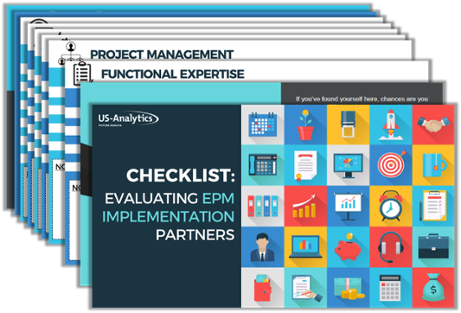Let’s be honest, EPM projects are expensive. It’s even more expensive when a project fails. These projects are intricate and require expertise that you can only get from an implementation partner. So, when the project fails, who’s to blame?
You probably want to place all the blame on the implementation partner. That might seem fair, especially if this is your first time venturing into the world of EPM. But, remember — you entered into a contract — so if certain parameters weren’t laid out, the partner can take your money and run.
But how can you tell when an implementation partner won’t live up to your expectations if you haven’t even started the project? In this blog post, we’ll cover the top six reasons EPM projects fail and the warning signs to look for while evaluating implementation partners.
Doesn’t identify your complexity gap
The complexity gap is the magnitude of change a project is expected to bring about, coupled with a company’s ability to embrace and manage change.
If you expect a lot of change to occur between your people, processes, and technology with a low ability to embrace change, you’re looking at a high complexity gap. A low complexity gap is the complete opposite: a small amount of change expected with a high ability to embrace change.
The complexity gap is important because it’s the first step in identifying the obstacles on the way to your finish line. The complexity gap will help you and your implementation partner understand the amount of time and budget that needs to be spent on this project. The higher the complexity gap, the more time and money you’ll need to spend on your project.
Warning signs: Discuss with the implementation how they define and quantify project complexity. What makes your EPM project complex? What are the suggested steps to control risk and complexity? Do they have a framework to organize the “complexity equation”?
If a prospective implementation partner doesn’t have process and advisory services, it’s a huge red flag. Process and advisory services show that a consulting firm has tried and true methods for mapping out an EPM project. A gap analysis is one offering that an implementation partner should recommend (especially if you’re new to EPM) if you’re looking to get started on a project.
Tools to help: If you want to start analyzing the gaps in people, process, and technology, the gap analysis is the place to start.
Lacks functional and technical expertise
When you think of implementing a tool such as Oracle Hyperion, you’re probably thinking about things like infrastructure requirements. These tools have a heavy technical aspect, so application development expertise is undoubtedly important. But just as important, and maybe not as obvious, is an implementation partner’s functional expertise. Strong functional expertise is key to identifying business requirements and designing your application around those requirements.
Warning signs: Your implementation team should consist of team members that have real-world corporate experience. A CPA right out of college just won’t do.
Technical experience is harder to sniff out. Most EPM firms will brag on their technical competencies, so you’ll need to ask specific questions about your requirements and how they’ll solve your problems. If they dodge your questions or can’t provide you with references, you should avoid working with that firm.
Fails to identify when contractors are used
It’s almost inevitable that an EPM firm will have to use a contractor at times. Occasionally, things get busy or projects take longer than expected at times, so they pull someone in from the outside.
Even if a contractor is used on your project, it doesn’t mean your implementation must suffer. A firm should notify you when a contractor will be used and tell you about their relationship with the contractor. Furthermore, the EPM firm should be set up in a way that provides oversight into the work a contractor is doing. There should be upper management who knows about your project and can step in if needed.
Warning signs: Some firms might only have a few full-time employees and only use contractors. What you need to look for is history and notoriety of employees within the EPM community. You should also ask about the consultant you’ll be working with, get their bio, and do some research of your own. If an implementation partner is trying to hide their use of a contractor, you can look up the identified consultant on social media, like LinkedIn, to see their job title.
Poor project management
With a project the size of an EPM implementation, you should expect a few roadblocks to occur. Solid project management from your implementation teams means they will anticipate potential roadblocks because they’ve been there before. A project manager will make sure all parties are held accountable for deadlines and help drive the project’s success. Without this, your EPM project is at risk of falling flat.
Warning signs: If you meet with implementation teams who can’t provide you with examples of successful projects like yours, you might want to consider going with someone else. Don’t be fooled by someone with a PMP certification. It can be a good sign, but don’t let it distract you from focusing on their experience managing projects like yours. You should also make sure a potential project manager has a personality that will fit well within your company culture.
Cuts corners and blames the tools
Tools like Hyperion Planning or HFM require a unique and refined set of skills. If your consultant cuts corners, chances are they’re just going to blame the tool later, saying something like, “well, that’s just how it works.” A skilled consultant will know how to manipulate an application and they’ll certainly know its faults. Their job isn’t just to install and move on — they’re there to implement. This means making the tool work for you, solving problems that arise, and reaching out to their team for help when they don’t know a solution to a problem.
Warning signs: Most consultants in this industry have decades of experience. Usually, they started off as a Hyperion admin, learned the ropes, and moved on to the consulting world. If you don’t get to meet the consultant first and learn about their credentials, run as fast as you can from that EPM firm.
Doesn’t play well with others
With a project that could take months, you need an implementation team who gets along with your team. Together you’re trekking up Mount Everest and, if you lose focus to start arguing, you’ll fail. Sure, it’s not a “freeze to death” kind of failure, but it could be a “lose your company thousands of dollars” type of failure. If you don’t work together, the project will not succeed.
Warning signs: If you’re only meeting with the sales team during the initial phase of your implementation partner search, that’s not a good sign. You need to set up meetings with the consultants you’ll potentially be working with. Everyone involved in the project on your end should be able to meet with everyone who will be involved from the EPM firm. This will help ensure the personalities are a right fit.






